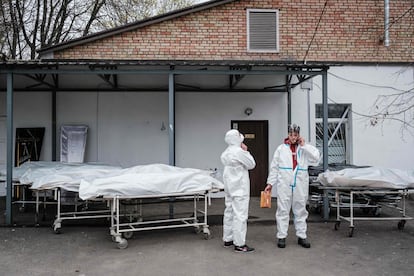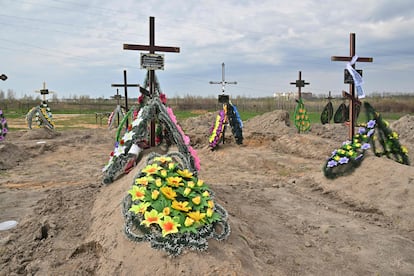UN report accuses Russia of war crimes in Ukraine, including summary executions of children
An investigation has confirmed the deaths of 441 civilians in three regions occupied by Russian forces early in the invasion, but investigators believe there are many more

In the course of the Russian invasion of Ukraine, which was launched on February 24, Kremlin troops have committed acts that can be considered as war crimes, according to the findings of a United Nations (UN) investigation that was published Wednesday. “There are strong indications that the summary executions documented in this report may constitute the war crime of wilful killing,” said Matilda Bogner, the Head of the UN Human Rights Monitoring Mission in Ukraine. The UN report also documents the summary executions of children by Russian forces.
Field work carried out by UN inspectors has detected the deaths of hundreds of civilians at the hands of Russian troops in the provinces of Kyiv, Chernihiv and Sumy between the day the full-scale invasion of Ukraine was ordered and April 6, when Moscow abandoned its attempt to win a swift victory by occupying the capital. During those six weeks of Russian occupation of the three provinces, the UN has confirmed the violent deaths of 441 civilians: 341 men and 72 women, as well as 20 boys and eight girls aged under 18.
The killings of these non-combatants were not limited to specific areas, although the UN states there were localities where Russian troops carried out attacks on civilians with greater intensity. This was the case in Bucha, which lies within Kyiv’s metropolitan belt, 25 kilometers (15 miles) west of the capital, where corpses remained scattered in the streets after the withdrawal of Russian forces. The UN mission has documented the executions of 73 civilians in Bucha – 54 men, 16 women, two boys and a girl), and are attempting to verify a further 105 cases. Local authorities put the number of people killed in the Bucha massacre at over 400.
There is significant eyewitness evidence that the battle for Bucha was not simply a confrontation between opposing military forces. “I am a civilian, I am a civilian, don’t shoot!” residents of Yablunska Street reported hearing before Russian soldiers riddled Oleg, a local chef who lived in the street, with bullets, according to testimonies collected by EL PAÍS.

Summary executions after Russian security checks
Summary executions often took place following security checks by Russian forces in the occupied zones. “A mere text message, a piece of camouflage clothing, or a record of previous military service could have fatal consequences,” Bogner said.
The report also details cases in which attacks were carried out without differentiating between military and non-military targets and in which no precautions were taken to avoid civilian casualties, as required by international laws governing conflicts, particularly the Geneva Convention. “Civilians were targeted on roads while moving within or between settlements, including while attempting to flee the hostilities,” Bogner added. On March 4, married couple Oleksandr and Natalia were attempting to escape Bucha when their car came under fire. He survived; she did not, their relatives told this newspaper.
The figure of 441 deaths in the UN report does not signify that these were the only killings of this kind that took place in the areas investigated by the observers. The report notes that the real number is probably considerably higher and that the UN mission is still in the process of corroborating a further 198 civilian deaths in Kyiv, Chernihiv and Sumy during the brief Russian occupation of the three provinces.
The report examined 100 civilian deaths in detail and concluded that 57 amounted to summary executions (48 men, seven women and two children). A total of 30 took place in Russian detention centers, while the remaining 27 victims were killed on the spot after being captured by Russian troops. “Russian soldiers brought civilians to makeshift places of detention and then executed them in captivity. Many of the victims’ bodies were found with their hands tied behind their backs and gunshot wounds to their heads,” Bogner said. The UN findings support evidence collected at the crime scenes after the Russian withdrawal and data released by the Ukrainian authorities.
Several Ukrainian and international institutions are investigating war crimes committed during the conflict. The United Nations Human Rights Office has said it will investigate allegations of a war crime on the Luhansk front after video footage emerged of the possible executions of 10 Russian soldiers by Ukrainian forces.
The UN report acknowledges that “although many months have passed since the first killings became known, much needs to be done to hold those responsible to account,” while also noting that it has received no indication that “Russian authorities have been actively investigating or prosecuting any of such cases,” something that Bogner has urged Moscow to undertake.
The total number of civilian deaths caused by the war in Ukraine from February 24 to December 5 now stands at 6,702, of which 424 are minors, according to UN figures.
Sign up for our weekly newsletter to get more English-language news coverage from EL PAÍS USA Edition
Tu suscripción se está usando en otro dispositivo
¿Quieres añadir otro usuario a tu suscripción?
Si continúas leyendo en este dispositivo, no se podrá leer en el otro.
FlechaTu suscripción se está usando en otro dispositivo y solo puedes acceder a EL PAÍS desde un dispositivo a la vez.
Si quieres compartir tu cuenta, cambia tu suscripción a la modalidad Premium, así podrás añadir otro usuario. Cada uno accederá con su propia cuenta de email, lo que os permitirá personalizar vuestra experiencia en EL PAÍS.
¿Tienes una suscripción de empresa? Accede aquí para contratar más cuentas.
En el caso de no saber quién está usando tu cuenta, te recomendamos cambiar tu contraseña aquí.
Si decides continuar compartiendo tu cuenta, este mensaje se mostrará en tu dispositivo y en el de la otra persona que está usando tu cuenta de forma indefinida, afectando a tu experiencia de lectura. Puedes consultar aquí los términos y condiciones de la suscripción digital.









































